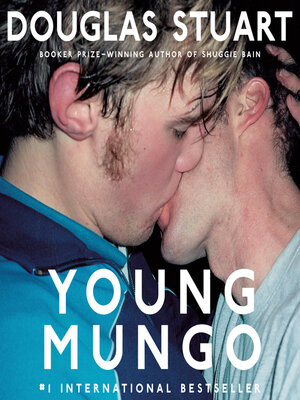
Sign up to save your library
With an OverDrive account, you can save your favorite libraries for at-a-glance information about availability. Find out more about OverDrive accounts.
Find this title in Libby, the library reading app by OverDrive.



Search for a digital library with this title
Title found at these libraries:
| Library Name | Distance |
|---|---|
| Loading... |
#1 INTERNATIONAL BESTSELLER
NAMED A BEST BOOK OF THE YEAR BY THE GLOBE AND MAIL • NPR • KIRKUS REVIEWS • TIME • AMAZON • THE WASHINGTON POST • THE TIMES (UK) • DAILY HIVE • THE TELEGRAPH • FINANCIAL TIMES • THE GUARDIAN • LITERARY HUB • THE HERALD (UK) • READER’S DIGEST • VANITY FAIR • LOS ANGELES REVIEW OF BOOKS
"Young Mungo seals it: Douglas Stuart is a genius." —The Washington Post
From the Booker Prize-winning author of Shuggie Bain, Young Mungo is both a vivid portrayal of working-class life and the deeply moving story of the dangerous first love of two young men.
Born under different stars, Protestant Mungo and Catholic James live in a hyper-masculine world. They are caught between two of Glasgow’s housing estates where young working-class men divide themselves along sectarian lines, and fight territorial battles for the sake of reputation. They should be sworn enemies if they’re to be seen as men at all, and yet they become best friends as they find a sanctuary in the dovecote that James has built for his prize racing pigeons. As they begin to fall in love, they dream of escaping the grey city, and Mungo must work hard to hide his true self from all those around him, especially from his elder brother Hamish, a local gang leader with a brutal reputation to uphold.
But the threat of discovery is constant and the punishment unspeakable. When Mungo’s mother sends him on a fishing trip to a loch in Western Scotland, with two strange men behind whose drunken banter lie murky pasts, he needs to summon all his inner strength and courage to get back to a place of safety, a place where he and James might still have a future.
Imbuing the everyday world of its characters with rich lyricism, Douglas Stuart’s Young Mungo is a gripping and revealing story about the meaning of masculinity, the push and pull of family, the violence faced by so many queer people, and the dangers of loving someone too much.
NAMED A BEST BOOK OF THE YEAR BY THE GLOBE AND MAIL • NPR • KIRKUS REVIEWS • TIME • AMAZON • THE WASHINGTON POST • THE TIMES (UK) • DAILY HIVE • THE TELEGRAPH • FINANCIAL TIMES • THE GUARDIAN • LITERARY HUB • THE HERALD (UK) • READER’S DIGEST • VANITY FAIR • LOS ANGELES REVIEW OF BOOKS
"Young Mungo seals it: Douglas Stuart is a genius." —The Washington Post
From the Booker Prize-winning author of Shuggie Bain, Young Mungo is both a vivid portrayal of working-class life and the deeply moving story of the dangerous first love of two young men.
Born under different stars, Protestant Mungo and Catholic James live in a hyper-masculine world. They are caught between two of Glasgow’s housing estates where young working-class men divide themselves along sectarian lines, and fight territorial battles for the sake of reputation. They should be sworn enemies if they’re to be seen as men at all, and yet they become best friends as they find a sanctuary in the dovecote that James has built for his prize racing pigeons. As they begin to fall in love, they dream of escaping the grey city, and Mungo must work hard to hide his true self from all those around him, especially from his elder brother Hamish, a local gang leader with a brutal reputation to uphold.
But the threat of discovery is constant and the punishment unspeakable. When Mungo’s mother sends him on a fishing trip to a loch in Western Scotland, with two strange men behind whose drunken banter lie murky pasts, he needs to summon all his inner strength and courage to get back to a place of safety, a place where he and James might still have a future.
Imbuing the everyday world of its characters with rich lyricism, Douglas Stuart’s Young Mungo is a gripping and revealing story about the meaning of masculinity, the push and pull of family, the violence faced by so many queer people, and the dangers of loving someone too much.







